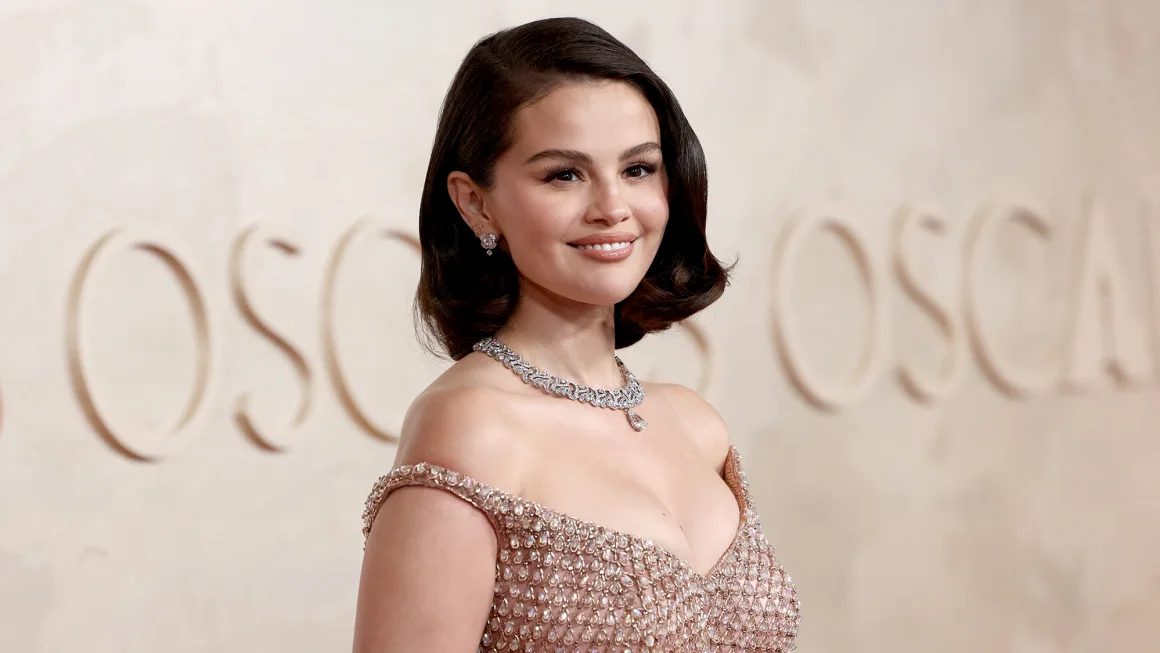According to Selena Gomez, Women Have It Much Harder Than Men On Social Media Selena Gomez, the multifaceted singer and actress, has never shied away from discussing the complexities of being in the public eye, especially when it comes to the effects of social media. In a recent interview with Jay Shetty, alongside her fiancé Benny Blanco, she opened up about the challenges women face online, acknowledging that they “have it much harder” than men when it comes to dealing with negative comments and criticism. This candid discussion, which took place during an episode of the “On Purpose With Jay Shetty” podcast, gave fans a deeper insight into the emotional toll that constant public scrutiny can take, particularly for women in the entertainment industry.
Blanco, a respected songwriter and record producer, seemed to have a more detached approach to social media. He explained that he doesn’t engage with comments and prefers to “freefall through life,” a perspective that contrasts sharply with Gomez’s more thoughtful and emotional stance. While Blanco clearly chooses to distance himself from the often toxic aspects of social media, Gomez is more affected by the criticisms she faces. She explained that women, especially those in the spotlight, are subjected to a much more intense level of judgment, particularly regarding their appearance.
Gomez’s observations about how women are scrutinized differently from men were not just about superficial issues, but also touched on the broader emotional toll that comes with being constantly evaluated by the public. She revealed that women face criticism over a wide range of factors: from their physical appearance to their personal lives, such as their relationships and even their ethnic backgrounds. According to Gomez, women’s worth is often reduced to how they look, who they date, and whether or not they fit a certain societal mold. She pointed out that this reality is incredibly difficult to navigate, especially when the criticism comes from all directions—whether it’s about their body, their career choices, or their social status.
In the interview, Gomez recalled how, before public events, she would prepare herself mentally for the inevitable judgment that would follow. “When I get prepared for an event, 90% of the time I just hope I can take the picture and sit down,” she shared, noting that the constant pressure to look a certain way can be overwhelming. She also revealed how she faces criticism over her identity, with people telling her that she isn’t “white enough” or “Mexican enough.” This aspect of her experience highlights the racial and cultural prejudices that often come into play, complicating an already difficult landscape of body shaming and personal judgment. For Gomez, these attacks on her identity can feel particularly hurtful, as she is often placed in a position where she is expected to conform to arbitrary standards set by others.
Despite the negative comments, Gomez emphasized that she understands the importance of not letting them define her. However, she admitted that she sometimes still falls into the trap of reading comments, even though she knows they do not contribute to her happiness or personal growth. “It doesn’t add to your life,” she said, reflecting on the futility of engaging with online negativity. Nonetheless, she also confessed that these comments can still affect her, even if she consciously tries to avoid them. “I just think it’s maybe a tad bitter,” she said, acknowledging the sadness that often accompanies the constant barrage of criticism. Yet, despite this, she insisted that she is not a victim but rather someone who is simply being honest about the emotional weight of it all.
Gomez also discussed how her weight has often been a point of contention for people online. She expressed her frustration with how much attention is given to her body, with people constantly weighing in on her appearance. This, in particular, seems to have been a recurring issue for her, as she explained that the pressure to maintain a certain body image can be incredibly disheartening. “My weight’s a big one, too. Everyone just has something to say and it’s really making me sad,” she said. But rather than seeing herself as a victim of these comments, Gomez made it clear that she recognizes the bitterness in the situation and feels a sense of guilt for even expressing these feelings. This complex mix of emotions reveals the deep internal struggle many public figures face when trying to reconcile their sense of self with the often harsh judgments they encounter online.
Despite these challenges, Gomez remains grounded and self-aware. She acknowledged that social media can have its positive aspects, such as the ability to connect with fans and raise awareness for important causes. However, she admitted that she no longer has social media on her phone, taking a break from the constant influx of information and judgment. This decision to step away from social media is a clear reflection of her desire to protect her mental health and well-being. “I’m human so of course sometimes I read things, but I do most of the time ignore most of everything,” she explained, showing that while it’s impossible to completely escape the influence of social media, she is actively taking steps to mitigate its negative impact on her life.
This conversation about the complexities of online hate and the pressures women face is particularly relevant in today’s digital age, where social media platforms can often serve as breeding grounds for toxicity. Gomez’s openness about her struggles provides a powerful example of how even those who seem untouchable to the public are deeply affected by the constant scrutiny of the online world. By sharing her experiences, she encourages others to recognize the harmful effects of these online comments and to take control of their own mental health in the face of negativity.
Through her vulnerability, Gomez is also offering a much-needed reminder that everyone, regardless of their public persona, is human. The challenges she faces in navigating her career and her personal life in the public eye are universal, and her willingness to speak out about them allows others to feel less alone in their own struggles. As she continues to advocate for mental health awareness and self-care, it’s clear that Gomez is not only a role model for how to manage the complexities of fame but also for how to remain resilient in the face of adversity.
In conclusion, Selena Gomez’s conversation with Benny Blanco and Jay Shetty highlights the emotional impact that social media can have on women, particularly those in the public eye. Her candidness about the difficulties of handling online hate and criticism serves as a reminder of the importance of self-care, mental health, and staying true to oneself in a world that often demands perfection. By addressing these issues openly, Gomez encourages others to be kinder, not just to public figures but to themselves as well, as they navigate the often overwhelming world of social media.


